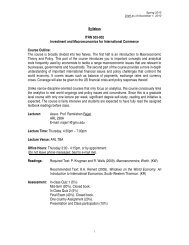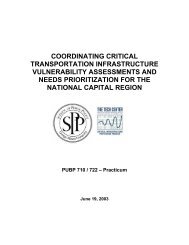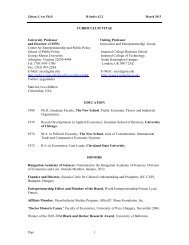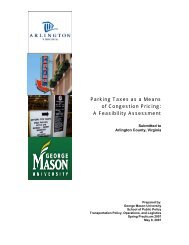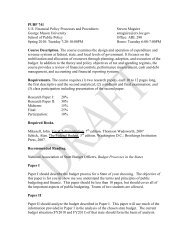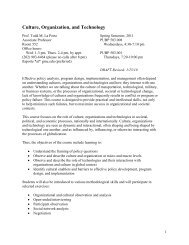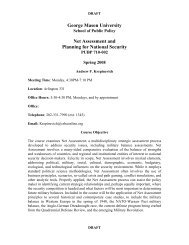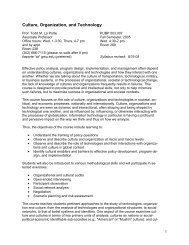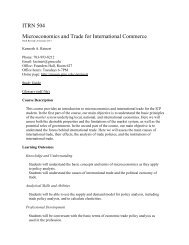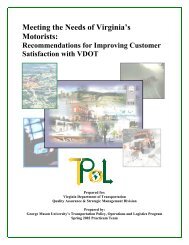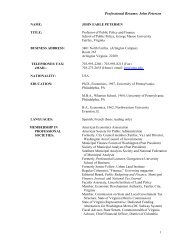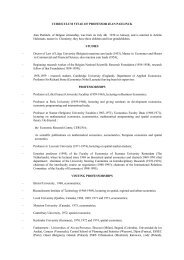Culture, Organization, and Technology - George Mason University
Culture, Organization, and Technology - George Mason University
Culture, Organization, and Technology - George Mason University
You also want an ePaper? Increase the reach of your titles
YUMPU automatically turns print PDFs into web optimized ePapers that Google loves.
<strong>Culture</strong>, <strong>Organization</strong>, <strong>and</strong> <strong>Technology</strong><br />
Prof. Todd M. La Porte<br />
Associate Professor<br />
Room 238<br />
Office hours: Wed. 2-6 <strong>and</strong> Thurs. 2-6 pm,<br />
<strong>and</strong> by appt.<br />
(202) 686-7115 (please no calls after 8 pm)<br />
tlaporte *at* gmu.edu (preferred)<br />
Fall Semester, 2010<br />
PUBP 503.003<br />
Wednesdays, 7:20-10:00 pm<br />
Room: TBA<br />
DRAFT Revised: 4/1/10<br />
Effective policy analysis, program design, implementation, <strong>and</strong> management often depend<br />
on underst<strong>and</strong>ing cultures, organizations <strong>and</strong> technologies <strong>and</strong> how they interact with one<br />
another. Whether we are talking about the culture of transportation, technological, military,<br />
or business systems, or the processes of organizational, societal or technological change,<br />
lack of knowledge of cultures <strong>and</strong> organizations frequently results in conflict or program or<br />
policy failure. This course is designed to provide practical <strong>and</strong> intellectual skills, not only<br />
to help minimize such failures, but to maximize success in organizational <strong>and</strong> societal<br />
contexts.<br />
This course focuses on the role of culture, organizations <strong>and</strong> technologies in societal,<br />
political, <strong>and</strong> economic processes, nationally <strong>and</strong> internationally. <strong>Culture</strong>, organizations<br />
<strong>and</strong> technology are seen as dynamic <strong>and</strong> interactional, often shaping <strong>and</strong> being shaped by<br />
technological one another, <strong>and</strong> as influenced by, influencing, or otherwise interacting with<br />
the processes of globalization.<br />
Thus, the objectives of the course include learning to:<br />
� Underst<strong>and</strong> the framing of policy questions<br />
� Observe <strong>and</strong> describe culture <strong>and</strong> organization at micro <strong>and</strong> macro levels<br />
� Observe <strong>and</strong> describe the role of technologies <strong>and</strong> their interactions with<br />
organizations <strong>and</strong> culture in global context<br />
� Identify cultural enablers <strong>and</strong> barriers to effective policy development, program<br />
design, <strong>and</strong> implementation<br />
Students will also be introduced to various methodological skills <strong>and</strong> will participate in<br />
selected exercises:<br />
� <strong>Organization</strong>al <strong>and</strong> cultural observation <strong>and</strong> analysis<br />
� Open-ended interviewing<br />
� Participant observation<br />
� Social network analysis<br />
� Negotiation<br />
1
The course teaches students pertinent approaches to the study of technologies, organization<br />
<strong>and</strong> culture, from the analysis of technologies <strong>and</strong> organizational structures, to social<br />
networks, to that of belief systems <strong>and</strong> identities.<br />
One aspect of the course examines culture <strong>and</strong> cultures in terms of two primary units of<br />
analysis: cultures as nations or social-political-economic identifiable sub-societies (e.g.,<br />
"American" or "Muslim" culture); <strong>and</strong> cultures as social-political-economic organizations,<br />
communities, or groups embedded or situated in national or trans-national units (e.g., the<br />
culture of digital society, of business consultants or engineers, of the FBI or the<br />
Department of Transportation).<br />
Finally, the course will give considerable attention to the dynamics between technologies,<br />
organizations <strong>and</strong> culture through a close look at how technologies underpin work <strong>and</strong><br />
social life, how technologies shape <strong>and</strong> are shaped by organizational forces, <strong>and</strong> how<br />
technologies become embedded in national industrial, social <strong>and</strong> cultural patterns,<br />
discernable over time <strong>and</strong> space. We will address the issue of control of technology as a<br />
policy matter as well.<br />
Requirements, Grades <strong>and</strong> Examinations<br />
There are three main requirements for the course: three assignments, a final exam, <strong>and</strong><br />
participation in class discussions.<br />
Writing assignments (3) 30%<br />
Final exam 35%<br />
Blackboard posting <strong>and</strong> discussion 20%<br />
Participation in class discussions 15%<br />
The first assignment is to analyze the social properties of technologies by doing without for<br />
one week a public technology you depend on heavily. Individual self-observation <strong>and</strong><br />
analysis is the focus of this assignment.<br />
The second assignment is to interview colleagues in your workplace, an organization you<br />
work in, or a school you have attended, to discover how it works, both formally <strong>and</strong><br />
informally, how decisions are made, who has authority <strong>and</strong> how they maintain it, <strong>and</strong> what<br />
the norms are that govern the behavior of its members. Participant observation techniques<br />
will be used in this assignment, including establishing an interview protocol, negotiating<br />
permission to interview where necessary, keeping detailed interview notes, <strong>and</strong> analyzing<br />
your data to find patterns <strong>and</strong> gain insight.<br />
The final assignment is to interview a person or family that has immigrated to the United<br />
States. This assignment will focus on cross-cultural issues <strong>and</strong> interviewing techniques.<br />
The object is to use an immigrant experience to compare <strong>and</strong> contrast cultures, values <strong>and</strong><br />
social norms, both the U.S. <strong>and</strong> sending country, to find out how your respondents have<br />
adapted to a new way of life, <strong>and</strong> how they managed conflicts about values <strong>and</strong> culture,<br />
including those affecting their sense of self, family <strong>and</strong> place. You must choose someone<br />
2
from a culture <strong>and</strong> continent other than your own; family members may not be<br />
interviewed.<br />
Detailed guidance about how to do these assignments will be provided in class.<br />
Participation in class discussion is essential. You will be expected to review carefully in<br />
advance the material assigned for each class <strong>and</strong> be prepared to discuss the important<br />
aspects of the readings in class (see “Blackboard Posting <strong>and</strong> Reading Discussion” section<br />
below). My role in this process will be to get the discussion started, assist the class in<br />
laying out the facts of the case, pose questions, <strong>and</strong> help the class to discover general<br />
principles running through the case that might be applicable in other situations.<br />
The final will be an open-book, open-note, take-home exam. It will emphasize mastery of<br />
the materials in the cases <strong>and</strong> the readings, particularly your ability to synthesize the<br />
material <strong>and</strong> analyze cases <strong>and</strong> examples.<br />
Texts<br />
The course is based on the following course texts, available at the Arlington Campus<br />
Bookstore. However, I recommend looking first at used book websites, such as Alibris.<br />
Access them via http://www.addall.com, which searches about 30 new <strong>and</strong> used books<br />
sites <strong>and</strong> lists results by price.<br />
Required books<br />
Nestle, Marion, Food Politics: How the Food Industry Influences Nutrition <strong>and</strong> Health,<br />
rev. ed, (Berkeley, CA: <strong>University</strong> of California Press, 2007), ISBN: 0520254031<br />
Hofstede, Gert <strong>and</strong> Hofstede, Geert-Jan, <strong>Culture</strong>s <strong>and</strong> <strong>Organization</strong>s: Software of the<br />
Mind, 2 nd ed., (New York: McGraw-Hill, 2005), ISBN: 0071439595, or any other<br />
edition.<br />
Morgan, Gareth, Images of <strong>Organization</strong>. updated ed., (Thous<strong>and</strong> Oaks, CA: SAGE<br />
Publications, 2006), ISBN: 1412939798, or any other edition.<br />
Venkatesh, Sudhir, Gang Leader for a Day, (New York: Penguin Books, 2008), ISBN:<br />
014311493X.<br />
Required film/video<br />
Manufactured L<strong>and</strong>scapes, available on DVD, Arlington Library reserve, Netflix (play on<br />
dem<strong>and</strong> or rent DVD), iTunes ($9.99 buy)<br />
Food, Inc., available on DVD, Netflix (play on dem<strong>and</strong> or rent DVD), I-Tunes ($3.99 rent<br />
or $14.99 buy)<br />
Who Killed the Electric Car, available on DVD, Arlington Library reserve, Netflix (rent<br />
DVD), iTunes (buy $9.99)<br />
3
Optional<br />
1984 (1984), available at Netflix (play on dem<strong>and</strong>, or rent DVD), iTunes ($2.99 rent or<br />
$9.99 buy), Also online (lower resolution) at YouTube.<br />
Kitchen Stories (2004), available at Netflix (play on dem<strong>and</strong>, or rent DVD).<br />
Periodical literature<br />
Read regularly the specialized journals or press, such as The Economist magazine, Foreign<br />
Policy, or Foreign Affairs. Also indispensable are the New York Times, the Financial<br />
Times, the Wall Street Journal, the Washington Post, <strong>and</strong> The Guardian in the UK.<br />
Diversity of perspective is important: don't limit yourself to publications that support only<br />
your own point of view.<br />
Group work<br />
I strongly encourage you to join with students in your own study groups to discuss the<br />
material. Student contact information will be exchanged at the first session to help you get<br />
these organized.<br />
Blackboard <strong>and</strong> library databases<br />
Book chapter <strong>and</strong> some other readings will be available through Blackboard.<br />
Journal articles are available through the Library's databases (journals or newspapers: use<br />
E-journal finder).<br />
To login to Blackboard, go to http://courses.gmu.edu<br />
Enter your GMU e-mail user name, WITHOUT the "gmu.edu". The password is your email<br />
password.<br />
Blackboard posting <strong>and</strong> reading discussions<br />
We will use the public Discussions function on Blackboard to jumpstart the class<br />
discussions of the weekly readings. Comments <strong>and</strong> critiques online will give you time to<br />
consider what your classmates have to say about the readings, <strong>and</strong> help us focus on core<br />
issues more quickly. Blackboard comments can also be useful as summaries <strong>and</strong><br />
discussions of readings, useful for preparing for the final exam.<br />
There will be two kinds of comments: Start-off Comments <strong>and</strong> Response Comments. The<br />
class will be divided in “A Group” <strong>and</strong> “B Group.”<br />
Each group will post Start-off or Response Comments on alternate weeks. Postings must<br />
be made by individuals, though you are encouraged to discuss your ideas in study groups.<br />
Start-off Comments are to be posted to Blackboard no later than 6 pm, 48 hours before<br />
class. Your contribution should be about 300-400 words, in which you:<br />
4
1. articulate any special insight or inspiration that week’s reading has given you, or<br />
any issues or problems you are having with it;<br />
2. raise <strong>and</strong> give initial thoughts on one or two questions the readings suggest that you<br />
would like your classmates to reflect on <strong>and</strong> discuss in class<br />
3. begin to analyze <strong>and</strong> synthesize the readings, both within a session (i.e. discuss how<br />
readings relate to one another) <strong>and</strong> across the whole course (i.e. discuss how your<br />
view of the general themes <strong>and</strong> issues of the course are shaped by the readings <strong>and</strong><br />
class discussions).<br />
Response Comments are to be posted by the group that has not posted Start-off Comments<br />
that week. They must be posted no later than 6 pm, 24 hours before class, <strong>and</strong> should also<br />
be about 300-400 words. Response Comments respond to the Start-off Comments <strong>and</strong><br />
begin (not end!) discussion on the topics raised.<br />
Posting weekly is required. You will be assigned to a comment group on the first day of<br />
class.<br />
Blackboard <strong>and</strong> Library Databases<br />
Book chapter <strong>and</strong> some other readings will be available through Blackboard.<br />
Journal articles are available through the Library's databases (journals or newspapers: use<br />
E-journal finder).<br />
To login to Blackboard, go to http://courses.gmu.edu<br />
Enter your GMU e-mail user name, WITHOUT the "gmu.edu". The password is your email<br />
password.<br />
A note on the workload<br />
This is (I hope) a fascinating but (I know) dem<strong>and</strong>ing class. There is a larger than normal<br />
reading load, as befits a 4-credit course. Films <strong>and</strong> audio broadcasts are also required from<br />
time to time, <strong>and</strong> will serve to break up the readings. The material itself is compelling:<br />
time flies when the reading is good. Group work is strongly encouraged as a way to<br />
manage the workload, as well as to connect with fellow classmates. If you have concerns<br />
about the amount of work required, please let me know.<br />
Writing help<br />
Diana Hacker's A Pocket Manual of Style is the st<strong>and</strong>ard style manual in use in the School,<br />
<strong>and</strong> you should become familiar with it. If you would like help with learning about how to<br />
compose your arguments or write more clearly, please contact the <strong>University</strong> Writing<br />
Center, http://writingcenter.gmu.edu, or see me.<br />
5
Student journal: New Voices in Public Policy<br />
I will nominate the very best papers in this course for publication in New Voices in Public<br />
Policy. New Voices is a student- <strong>and</strong> faculty-reviewed journal that shares SPP's finest<br />
student work with the rest of the world.<br />
Disabilities<br />
If you are a student with a disability <strong>and</strong> you need academic accommodations, please see<br />
me <strong>and</strong> contact the Office of Disability Services (ODS) at 993-2474. All academic<br />
accommodations must be arranged through the ODS.<br />
Grading criteria<br />
For purposes of this course, the grades of A or A- are reserved for sustained excellence <strong>and</strong><br />
outst<strong>and</strong>ing performance on all aspects of the course. The grades of B <strong>and</strong> B+ are used to<br />
denote mastery of the material <strong>and</strong> very good performance on all aspects of the course.<br />
The grade of B- denotes marginal quality work that is not quite up to graduate level<br />
st<strong>and</strong>ards. The grade of C denotes work that may be adequate for undergraduate<br />
performance, but is not acceptable at the graduate level. The grade of F denotes the failure<br />
to perform adequately on course assignments.<br />
Class partipication <strong>and</strong> Blackboard discussion grading criteria<br />
A Student is actively engaged in <strong>and</strong> posts to Blackboard for every class, well in<br />
advance for all members to read <strong>and</strong> react to. Voluntarily raises questions <strong>and</strong><br />
thoughtfully contributes in each class session. Posts frequently refer to readings <strong>and</strong><br />
contributions of other students, both from Blackboard postings <strong>and</strong> from class<br />
discussions. All readings are discussed thoughtfully, <strong>and</strong> student makes a strong<br />
effort to synthesize material <strong>and</strong> explore its meaning <strong>and</strong> implications. Builds on<br />
other student comments, <strong>and</strong> is respectful of the views of others. Postings often raise<br />
questions about the material, both in the context of a particular session, but also more<br />
thematically, across the course as a whole. Writing is clear, logical, <strong>and</strong> succinct.<br />
A- Student frequently participates in class, <strong>and</strong> posts for nearly every class, sufficiently<br />
in advance for most members to read <strong>and</strong> react to. Engages in class discussions<br />
without prompting. Prepared most of the time, but not always. Posts refer to<br />
readings <strong>and</strong> contributions of other students, both from Blackboard <strong>and</strong> class<br />
discussions. Most readings are discussed, <strong>and</strong> student makes a effort to synthesize<br />
material <strong>and</strong> explore its meaning <strong>and</strong> implications. Postings raise questions about the<br />
material, both in the context of a particular session, but also thematically, across the<br />
course as a whole. Writing is clear, logical, <strong>and</strong> succinct. Performance is good, but<br />
not consistently excellent.<br />
B+ Student attends class <strong>and</strong> participates in discussions sometimes, but performance is<br />
not consistent. Posts for most class sessions, <strong>and</strong> in time for readers to react. Posts<br />
6
often refer to readings <strong>and</strong> contributions from other students, but not as frequently as<br />
above. Postings refer often to one or two readings rather than all or nearly all, but<br />
they provide insight into the material discussed. Postings sometimes raise questions<br />
about the readings in the context of the class discussion at h<strong>and</strong>. Writing is usually<br />
clear, logical <strong>and</strong> succinct, with only an occasional overly long paragraph or run-on<br />
sentence.<br />
B Student attends class <strong>and</strong> participates in discussions sometimes, but performance is<br />
not consistent. Student responds when asked, but does little beyond that. Posts for a<br />
majority of class sessions, <strong>and</strong> usually in time for readers to react. Posts sometimes<br />
refer to readings <strong>and</strong> contributions from other students, but sometimes not. Postings<br />
mostly refer to a particular reading, mostly as a summary or description, rather than<br />
an analysis. May get online discussion off track. Questions are only occasionally<br />
raised about the readings. Writing is sometimes unclear or exhibits questionable<br />
logic, <strong>and</strong> can be succinct, with only an occasional overly long paragraph or run-on<br />
sentence.<br />
B- Student attends class, but is rather passive, <strong>and</strong> seldom volunteers to answer<br />
questions. Student reluctantly participates, <strong>and</strong> sometimes misses posting, sometimes<br />
not in time for readers to react. Readings are generally not the focus of the postings<br />
as much as a discussion of some of the ideas that the material raises. Personal<br />
commentary dominates the discussion. Writing is sometimes hard to underst<strong>and</strong>, due<br />
to flaws in logic, grammar or structure.<br />
C Student does not attend all classes, <strong>and</strong> posts on an irregular basis, usually not in time<br />
for readers to react. Comes to class unprepared to answer basic questions. Seldom<br />
volunteers for anything, very passive. Perfunctory postings refer to some of the ideas<br />
that the material raises, but readings are mentioned only in passing. Most of the<br />
postings are reactive only, <strong>and</strong> sometimes it is hard to tell if the student read any of<br />
the assigned readings or other postings at all. Posts are brief, with little substance,<br />
<strong>and</strong> hard to underst<strong>and</strong>. Usually seems to be present only in body, but not in mind<br />
<strong>and</strong> spirit. Takes notes <strong>and</strong> hopes that he/she will not have to speak.<br />
Grade equivalents are given below. These values will be used to calculate grades.<br />
A 4.00 3.68 100 92.01<br />
A- 3.67 3.34 92.00 84.01<br />
B+ 3.33 3.01 84.00 75.01<br />
B 3.00 2.68 75.00 68.01<br />
B- 2.67 2.34 68.00 58.01<br />
C 2.33 2.00 58.00 50.00<br />
F 1.99 0.00 49.00 00.00<br />
7
Missed class sessions<br />
Missing class is strongly discouraged, <strong>and</strong> I will not admit students who do not attend the<br />
first session, even with notice. More than one absence may jeopardize your grade, if not<br />
your ability to keep up with our rapid pace.<br />
If for some reason you cannot attend a class, your participation grade can be maintained<br />
by providing me a 750-word summary <strong>and</strong> analysis of the week's reading, with special<br />
attention to the critical questions they raise. This is to ensure that you have dug into the<br />
material, <strong>and</strong> will therefore have less risk falling behind the rest of the class.<br />
Plagiarism<br />
All work must be your own. In general, where the work of others is used, even in<br />
paraphrased form, it must appropriately referenced. When in doubt, cite! Plagiarism is<br />
an Honor Code violation: http://www.gmu.edu/facstaff/h<strong>and</strong>book/aD.html<br />
The main things to keep in mind:<br />
1) Know your sources <strong>and</strong> what they say.<br />
2) Keep track of your sources when you copy <strong>and</strong> paste, <strong>and</strong> cite them accurately.<br />
3) If you quote a key source, explain what the author says in your own words.<br />
4) Avoid the temptation to simply change a few words or sentence order in a copied text.<br />
This is not original writing, but instead is incorrect paraphrasing, which is a form of<br />
plagiarism.<br />
5) If deadline pressure leads you to even consider passing off others’ work as your own,<br />
DON'T DO IT. Contact me to discuss your situation. There are better ways to deal<br />
with stress than to risk expulsion.<br />
If you have any questions about correct citation, paraphrasing <strong>and</strong> writing, let me<br />
know. The following resources will also help:<br />
GMU <strong>University</strong> Writing Center<br />
Avoiding Plagiarism<br />
http://writingcenter.gmu.edu/resources/plagiarism.html<br />
Turnitin@<strong>Mason</strong><br />
http://www.irc.gmu.edu/turnitin/resources.html<br />
Washington State <strong>University</strong><br />
http://www.wsulibs.wsu.edu/plagiarism/main.html<br />
Indiana <strong>University</strong><br />
How to avoid plagiarism<br />
Written for students by the writing center at Indiana <strong>University</strong>.<br />
http://www.indiana.edu/~wts/pamphlets/plagiarism.shtml<br />
8
Purdue <strong>University</strong><br />
Avoiding Plagiarism<br />
A useful site from the excellent Purdue Writing Center for students. Includes exercises.<br />
http://owl.english.purdue.edu/h<strong>and</strong>outs/research/r_plagiar.html<br />
Here follows the official SPP Policy on Plagiarism:<br />
The profession of scholarship <strong>and</strong> the intellectual life of a university as well as the field of public<br />
policy inquiry depend fundamentally on a foundation of trust. Thus any act of plagiarism strikes<br />
at the heart of the meaning of the university <strong>and</strong> the purpose of the School of Public Policy. It<br />
constitutes a serious breach of professional ethics <strong>and</strong> it is unacceptable.<br />
Plagiarism is the use of another’s words or ideas presented as one’s own. It includes, among<br />
other things, the use of specific words, ideas, or frameworks that are the product of another’s<br />
work. Honesty <strong>and</strong> thoroughness in citing sources is essential to professional accountability <strong>and</strong><br />
personal responsibility. Appropriate citation is necessary so that arguments, evidence, <strong>and</strong> claims<br />
can be critically examined.<br />
Plagiarism is wrong because of the injustice it does to the person whose ideas are stolen. But it<br />
is also wrong because it constitutes lying to one’s professional colleagues. From a prudential<br />
perspective, it is shortsighted <strong>and</strong> self-defeating, <strong>and</strong> it can ruin a professional career.<br />
The faculty of the School of Public Policy takes plagiarism seriously <strong>and</strong> has adopted a zero<br />
tolerance policy. Any plagiarized assignment will receive an automatic grade of “F.” This may<br />
lead to failure for the course, resulting in dismissal from the <strong>University</strong>. This dismissal will be<br />
noted on the student’s transcript. For foreign students who are on a university-sponsored visa<br />
(eg. F-1, J-1 or J-2), dismissal also results in the revocation of their visa.<br />
To help enforce the SPP policy on plagiarism, all written work submitted in partial fulfillment of<br />
course or degree requirements must be available in electronic form so that it can be compared<br />
with electronic databases, as well as submitted to commercial services to which the School<br />
subscribes. Faculty may at any time submit student’s work without prior permission from the<br />
student. Individual instructors may require that written work be submitted in electronic as well as<br />
printed form. The SPP policy on plagiarism is supplementary to the <strong>George</strong> <strong>Mason</strong> <strong>University</strong><br />
Honor Code; it is not intended to replace it or substitute for it.<br />
(http://www.gmu.edu/facstaff/h<strong>and</strong>book/aD.html)<br />
'Nuf said.<br />
9
Course Syllabus<br />
Session 1: Introduction to the Topic <strong>and</strong> Overview of Course<br />
All reading <strong>and</strong> viewing is required to be completed before we meet for the first session.<br />
This section will introduce the course <strong>and</strong> its key topics. We'll talk about how the course will<br />
connect the three seemingly disparate themes, which in reality are integrated in fascinating ways.<br />
Technologies are our starting place, but the readings for this week take us into the other domains<br />
of the course as well, <strong>and</strong> show that it is fruitful to consider all three together to underst<strong>and</strong> their<br />
importance to public policy.<br />
We’ll also get started thinking about assignments, class organization <strong>and</strong> requirements. Since we<br />
meet in the evening, I’ll get the ball rolling with a class snack.<br />
As the semester starts, I’d like to get your intellectual <strong>and</strong> public policy juices flowing by<br />
watching several fascinating <strong>and</strong> controversial films: Food, Inc., Who Killed the Electric Car<br />
<strong>and</strong> Manufactured L<strong>and</strong>scapes. Each film takes up important questions about technology,<br />
organization <strong>and</strong> culture, <strong>and</strong> are deeply intertwined with contemporary public policy debates.<br />
Each is very entertaining. Each is required viewing later in the semester, but may be seen before<br />
we begin meeting as well.<br />
We’ll use these films as early starting points in our conversations about how technological or<br />
industrial development, large-scale organizations, culture, <strong>and</strong> public policymaking interact <strong>and</strong><br />
influence modern society <strong>and</strong> public wellbeing. Viewing <strong>and</strong> discussion questions will be<br />
distributed by e-mail before the term begins.<br />
Agre, Philip E., “How to Be a Leader in Your Field: A Guide for Students in Professional<br />
Schools,” Department of Information Studies, <strong>University</strong> of California. Available at:<br />
http://polaris.gseis.ucla.edu/pagre/leader.html<br />
Volti, Rudi. (2000). Society <strong>and</strong> Technological Change, 4 th ed. (New York: Worth Publishers),<br />
chapter 1, "The nature of technology," pp. 3-16.<br />
Pacey, Arnold, The <strong>Culture</strong> of <strong>Technology</strong>, (London: MIT Press, 1983), chapter 1, pp. 1-12.<br />
Westrum, Ron, Technologies <strong>and</strong> Society: The Shaping of People <strong>and</strong> Things, (Belmont, CA:<br />
Wadsworth Publishing Co., 1991), chapter 1, “The shaping of people <strong>and</strong> things,” pp. 3-<br />
19.<br />
Session 2: <strong>Technology</strong> <strong>and</strong> Progress<br />
Thinking about technology means thinking about progress. Most people have no doubt that<br />
technology is good, <strong>and</strong> that more is better. It almost goes without saying that innovation <strong>and</strong><br />
economic growth based on technological development has meant rising material welfare, <strong>and</strong><br />
greater national economic, political <strong>and</strong> military power. The evidence of the truth of this is<br />
apparent all around us.<br />
But this conventional assessment is also superficial. There is a lot more going on in how people<br />
<strong>and</strong> technologies interact, <strong>and</strong> in how people think of them. The very idea of progress has<br />
10
undergone significant change, <strong>and</strong> will continue to evolve. In addition, technological changes<br />
will affect nearly everyone, <strong>and</strong> the pace of this change is picking up. Scale, complexity <strong>and</strong><br />
unintended consequences of technological development seem to be accelerating at an alarming<br />
rate. So, how should we think about technological change? Who benefits from such changes?<br />
Does technology have a “dark side?”<br />
Manufactured L<strong>and</strong>scapes, Jennifer Baichwal, director, Foundry Films <strong>and</strong> the National Film<br />
Board of Canada, 2007.<br />
Marx, Leo, “Does improved technology mean progress?” <strong>Technology</strong> Review, vol. 90, Jan. 1987,<br />
p. 32+.<br />
Volti, Rudi, Society <strong>and</strong> Technological Change, 4 th ed., (New York: Worth Publishers, 2000),<br />
chapter 2, "Winners <strong>and</strong> losers," pp. 17-32.<br />
Schumacher, E. F., “Buddhist economics,” in <strong>Technology</strong> <strong>and</strong> the Future, Al Teich, ed., 7 th ed.<br />
(Belmont, CA: Wadsworth/Thomson, 1993), pp. 231-238. Excerpt originally published<br />
in Schumacher, E. F., Small is Beautiful: Economics As If People Mattered, (New York:<br />
Harper Collins, 1973).<br />
Brown, <strong>George</strong> E., Jr., “<strong>Technology</strong>'s dark side,” The Chronicle of Higher Education, vol. 39,<br />
issue 43, June 30, 1993, p. B1.<br />
Wetmore, James, “Amish technology: reinforcing values <strong>and</strong> building community,” IEEE<br />
<strong>Technology</strong> <strong>and</strong> Society Magazine, vol. 26, issue 2, Summer 2007, pp. 10-21.<br />
Winner, Langdon, “Look out for Luddites,” <strong>Technology</strong> Review, November/December 1997, p.<br />
62.<br />
Session 3: Two Paradigms of <strong>Technology</strong>, <strong>Organization</strong> <strong>and</strong> <strong>Culture</strong>: Automobiles <strong>and</strong> the<br />
Food System in Modern America<br />
This session starts out with a close look at two of the most influential <strong>and</strong> powerful technology<br />
systems the world has ever known: the gas-powered, internal combustion automobile, <strong>and</strong> the<br />
modern American food system. In this session, we will take aim at the importance of<br />
technological systems, as contrasted to technological artifacts or “gadgets.” This difference in<br />
perspective is important, for much of the “wow” factor in contemporary technology focuses on<br />
single elements of much more complex systems that have important social <strong>and</strong> political<br />
properties that far outweigh their importance as cool gizmos.<br />
Called “the machine that changed the world,” the automobile is an ideal vehicle (excuse the pun)<br />
for looking at a technical system in all its technological, organizational, political, economic <strong>and</strong><br />
cultural glory. And the modern food system, which feeds a vast majority of Americans, <strong>and</strong><br />
increasingly people around the world, is fast becoming one of the most powerful influences on<br />
contemporary life. Both are at the heart of numerous current policy debates in energy,<br />
environment, agriculture, public health, national security, <strong>and</strong> many others.<br />
Studying automobiles <strong>and</strong> food as complex technological, organizational <strong>and</strong> cultural systems, is<br />
not just ends in themselves. They are also paradigms for looking at any large technological<br />
system, in any society <strong>and</strong> level of development.<br />
Food, Inc., Robert Kenner, director, Participant Media, 2008.<br />
11
Volti, Rudi, “A century of automobility,” <strong>Technology</strong> <strong>and</strong> <strong>Culture</strong>, vol. 37, no. 4, October 1996,<br />
pp. 663-685.<br />
Meyer, Stephen, “Labor,” <strong>and</strong> Melosi, Martin V., “Environment,” documents on website<br />
Automobile in American Life <strong>and</strong> Society, <strong>University</strong> of Michigan, Dearborn <strong>and</strong> Benson<br />
Ford Research Center, 2004. Online at: http://www.autolife.umd.umich.edu/ (with<br />
photos <strong>and</strong> additional material on design, gender, <strong>and</strong> race) or in Word documents<br />
(without photos) on Blackboard).<br />
“White Heat: Beat of the System,” BBC, 1994. Online at:<br />
http://www.youtube.com/watch?v=JgvYGi5J-Cg (8:21)<br />
“Working at Ford in the 1920s,” “Ford During the Slide into the Great Depression,”<br />
Part 1: http://www.youtube.com/watch?v=QtYRLtT8bvY&feature=related (4:23)<br />
Part 2: http://www.youtube.com/watch?v=1Re-yUnO-Hk&feature=related (7:05)<br />
Part 3: http://www.youtube.com/watch?v=q5J2zW7mvyM&NR=1 (8:27)<br />
Schlosser, Eric, “Fast-Food Nation, part 1: The True Cost Of America's Diet,” Rolling Stone,<br />
Issue 794, September 3, 1998, pp. 58+ AND “Fast-Food Nation, part 2: Meat <strong>and</strong><br />
Potatoes,” Rolling Stone, Issue 800, November 26, 1998, p. 68+.<br />
Hassan, Zaid, “Postcards from the Global Food System,” parts 1-3, February 26, March 7, <strong>and</strong><br />
March 31, 2005, WorldChanging website. Online at:<br />
http://www.worldchanging.com/archives/002224.html <strong>and</strong> subsequent links, or<br />
reformatted <strong>and</strong> posted on BlackBoard.<br />
Session 4: Technological Choices, Sponsors <strong>and</strong> Politics<br />
One common way of thinking about technologies is to consider them as inanimate objects. But<br />
this narrow view obscures important economic <strong>and</strong> political factors that give life to technologies<br />
<strong>and</strong> enable them to take enduring roles in our world. We need to consider “who” as well as<br />
“what” technologies are. How are technologies chosen? Why do we have one particular design<br />
or configuration of a technology or technological system rather than another? Is it the case that<br />
the “best” technology wins out over its competitors, as celebrated in the old phrase “Build a<br />
better mousetrap <strong>and</strong> the world will beat a path to your door”? Or are there other factors at play,<br />
such as path dependence, economic power, lobbying <strong>and</strong> marketing, bureaucratic politics, <strong>and</strong><br />
the like, that help determine the outcome? Are there matters of social justice <strong>and</strong> democratic<br />
politics at stake?<br />
Westrum, Ron, Technologies <strong>and</strong> Society: The Shaping of People <strong>and</strong> Things, (Belmont, CA:<br />
Wadsworth Publishing Co., 1991), chapter 9, “The sponsorship of technology,” pp. 171-<br />
193.<br />
Who Killed the Electric Car? Chris Paine, director, Sony Pictures Home Entertainment, 2006.<br />
Kirsch, David, The Electric Vehicle <strong>and</strong> the Burden of History, (New Brunswick, NJ: Rutgers<br />
<strong>University</strong> Press, 2000), chapter 8, “Industrial ecology <strong>and</strong> the future of the automobile:<br />
large-scale technological systems, technological choice, <strong>and</strong> public policy,” pp. 228-237.<br />
Nestle, Marion, Food Politics: How the Food Industry Influences Nutrition <strong>and</strong> Health, rev. ed,<br />
(Berkeley, CA: <strong>University</strong> of California Press, 2007), “Introduction,” pp. 1-30, “Part 1:<br />
Undermining Dietary Advice,” <strong>and</strong> “Part 2: Working the System,” pp. 93-171.<br />
Pollan, Michael, “Farmer in Chief,” New York Times Magazine, October 9, 2008. Online at:<br />
http://www.nytimes.com/2008/10/12/magazine/12policy-t.html . See also “Interview<br />
12
with Michael Pollan,” parts 1 <strong>and</strong> 2, NOW with Bill Moyers, Public Broadcasting Service,<br />
November 28, 2008. Online at:<br />
http://www.pbs.org/moyers/journal/11282008/watch.html (21:29, 21:03)<br />
Additional cases:<br />
Cowan, Ruth Schwartz, “How the refrigerator got its hum,” in The Social Shaping of<br />
<strong>Technology</strong>: How the Refrigerator Got Its Hum, Donald MacKenzie <strong>and</strong> Judy Wajcman,<br />
eds., (Milton Keynes: Open <strong>University</strong> Press, 1985), pp. 202-218.<br />
Fallows, James, “The American Army <strong>and</strong> the M-16 rifle,” chapter 6 in The Social Shaping of<br />
<strong>Technology</strong>, 2 nd ed., (Buckingham: Open <strong>University</strong> Press, 1999), pp. 382-394.<br />
Session 5: Controlling Technologies: Ethics, Risk <strong>and</strong> Democracy<br />
In this session, we move from a discussion about underst<strong>and</strong>ing technologies as they affect<br />
individuals, organizations, society <strong>and</strong> cultures, to one about controlling them. We want to<br />
reduce the likelihood that technologies will result in harm to, <strong>and</strong> make them more consistent<br />
with norms of democratic societies. Technological controversies suggest that the interests of<br />
technology designers <strong>and</strong> promoters are out of alignment with the interests of some parts of the<br />
public, but controversies can also provide the means for technology designers to incorporate<br />
feedback.<br />
Winner, Langdon, “Do artifacts have politics?” in The Whale <strong>and</strong> the Reactor (Chicago:<br />
<strong>University</strong> of Chicago Press, 1986), pp. 19-39.<br />
Jonas, Hans, “<strong>Technology</strong> <strong>and</strong> responsibility: reflections on the new tasks of ethics,” Social<br />
Research, vol. 40, no. 1, Spring 1973, pp. 3l-54.<br />
Giddens, Anthony, “Risk,” Runaway World, (New York: Routledge, 2000), pp. 38-53.<br />
Nelkin, Dorothy, “Science, technology, <strong>and</strong> political conflict: analyzing the issues,” in<br />
Controversy: Politics of Technical Decisions, Dorothy Nelkin, ed., (Beverly Hills, CA;<br />
SAGE Publications, 1979), pp. 9-22.<br />
Westrum, Ron, Technologies <strong>and</strong> Society: The Shaping of People <strong>and</strong> Things, (Belmont, CA:<br />
Wadsworth Publishing Co., 1991), chapter 15, “Social control of technologies,” pp. 293-<br />
322, <strong>and</strong> chapter 17, “Foresight <strong>and</strong> intelligence,” pp. 353-380.<br />
Volti, Rudi, Society <strong>and</strong> Technological Change, 4 th ed. (New York: Worth Publishers),<br />
chapter 17, “Governing technology,” pp. 294-310.<br />
“Ruining It for the Rest of Us,” This American Life, episode 370, December 19, 2008. Online at:<br />
http://www.thislife.org/Radio_Episode.aspx?episode=370. Segment “Act One: Shots in<br />
the Dark” on people who don’t believe in measles vaccinations (21:00).<br />
Session 6: Language, Politics <strong>and</strong> <strong>Culture</strong><br />
Language shapes what we think <strong>and</strong> believe in, <strong>and</strong> how we act. The words <strong>and</strong> metaphors we<br />
use to think <strong>and</strong> communicate can shape how we perceive the world, <strong>and</strong> thereby enable or<br />
constrain certain types of action. They also may contain hints of individuals' moral foundations,<br />
which in turn can affect policy <strong>and</strong> culture. At the same time, the production <strong>and</strong> dissemination<br />
of language in mass society, both totalitarian <strong>and</strong> liberal-democratic, has changed profoundly<br />
during the industrial era. This session will look at language <strong>and</strong> politics, <strong>and</strong> examine some of<br />
13
the institutional features that shape their use <strong>and</strong> development, particularly in market-based<br />
societies.<br />
With these readings, we set the stage for underst<strong>and</strong>ing how certain kinds of political discourse,<br />
advertising <strong>and</strong> public relations emerged as ways to manage society in the early 20th century, as<br />
the productive power of industry began to create tremendous economic <strong>and</strong> social changes in the<br />
developed societies. Central to this story is Edward Bernays, the founder of modern public<br />
relations <strong>and</strong> advertising, <strong>and</strong> a nephew of Sigmund Freud.<br />
Curtis, Adam, Century of the Self, British Broadcasting Corporation/Channel Four documentary,<br />
London: RDF International, 2006, 2002. Online at:<br />
http://www.archive.org/details/AdaCurtisCenturyoftheSelf_0 (58:25)<br />
Ewen, Stuart, Captains of Consciousness, (New York: McGraw-Hill, 1976), pp. 3-39.<br />
Lindblom, Charles E., “The Market as Prison,” Journal of Politics, vol. 44, no. 2, May 1982, pp.<br />
324-336.<br />
Pollay, Richard W., "Propag<strong>and</strong>a, puffing <strong>and</strong> the public interest,” Public Relations Review, vol.<br />
16, 1990, pp. 39-54. Online at:<br />
http://legacy.library.ucsf.edu/cgi/getdoc?tid=zkh84c00&fmt=pdf&ref=results<br />
Nestle, Marion, Food Politics: How the Food Industry Influences Nutrition <strong>and</strong> Health, rev. ed,<br />
(Berkeley, CA: <strong>University</strong> of California Press, 2007), “Part 3: Exploiting Kids,<br />
Corrupting Schools,” pp. 173-218. See also Nestle, Marion, "What to Eat: Personal<br />
Responsibility or Social Responsibility," College of the Atlantic conference Food for<br />
Thought, Time for Action: Sustainable Food, Farming <strong>and</strong> Fisheries for the 21st<br />
Century, October 3, 2009. Available at: http://sciencestage.com/v/15355/marion-nestlewhat-to-eat-personal-responsibility-or-social-responsibility.html<br />
(72:00)<br />
Lakoff, <strong>George</strong>, Moral Politics: How Liberals <strong>and</strong> Conservatives Think, 2 nd ed., (Chicago:<br />
Univ. of Chicago Press, 1996, 2002), chapter 2, "The worldview problem for American<br />
politics," pp. 24-37, <strong>and</strong> chapter 10, "Social programs <strong>and</strong> taxes," pp. 179-196.<br />
Optional:<br />
Orwell, <strong>George</strong>, 1984, (London : Secker & Warburg, 1949), chapters 1-4. Online at:<br />
http://www.mondopolitico.com/library/1984/1984.htm<br />
1984, Michael Radford, director, from the novel by <strong>George</strong> Orwell, Virgin Films, 2003. Online<br />
at: http://video.google.com/videoplay?docid=-<br />
5464625623984168940&ei=DvXiSLTuKZLAqAKT--XFBw&q=google+1984+orwell<br />
PBS Frontline: “The persuaders,” Douglas Rushkoff, correspondent, November 9, 2004, chapter<br />
5, “Give us what we want.” Online at:<br />
http://www.pbs.org/wgbh/pages/frontline/shows/persuaders/ (13:02)<br />
Luntz, Frank, “The environment: a cleaner, safer, healthier America,” The Luntz Companies:<br />
Straight Talk, research memo, pp. 131-146. Online at:<br />
http://www2.bc.edu/~plater/Newpublicsite06/suppmats/02.6.pdf<br />
Session 7: How to Find Out What’s Going On with People: Varieties of Ethnographic<br />
Methods<br />
In this session we’ll explore the various ways that students of organizations, society <strong>and</strong> culture<br />
come to underst<strong>and</strong> what is going on in the messy human reality “out there.”<br />
14
Venkatesh, Sudhir, Gang Leader for a Day, (New York: Penguin Books, 2008).<br />
Schutt, R. K., “Qualitative methods: observing, participating, listening,” chapter 8 in<br />
Investigating the Social World: The Process <strong>and</strong> Practice of Social Research, 3rd ed.,<br />
(Thous<strong>and</strong> Oaks, CA: Pine Forge Press, 2001), pp. 263-325.<br />
U.S. Government Accounting Office, Ethnographic Studies Can Inform Agencies’ Actions,<br />
GAO-03-455, March 2003, (see especially pp. 1-14). Online at<br />
http://www.gao.gov/new.items/d03455.pdf<br />
Geertz, Clifford, “Thick description: toward an interpretive theory of culture,” chapter 1 in The<br />
Interpretation of <strong>Culture</strong>s, (New York: Basic Books, 1974), pp. 3-30.<br />
Lahiri, Jhumpa, “Mrs. Sen’s,” Interpreter of Maladies, (New York: Houghton Mifflin, 1999),<br />
pp. 111-135.<br />
“Shouting Across the Divide,” This American Life, episode 322, December 15, 2006. Online at:<br />
http://www.thisamericanlife.org/Radio_Episode.aspx?sched=1163 (55:00)<br />
Optional:<br />
Kitchen Stories, Bent Hamer, director, MGM Entertainment, 2004.<br />
Session 8: <strong>Organization</strong>s: From Simple to Complex, <strong>and</strong> the Search for Rationality<br />
Human life is so entangled with organizations that we hardly notice them – except that we notice<br />
them literally all the time. In many respects, they co-evolved with large-scale industry <strong>and</strong><br />
technology. Yet taking a few steps back <strong>and</strong> seeing what organizations really are, what they do,<br />
<strong>and</strong> how they operate is critical for being able to work effectively with them. This session will<br />
sharpen our underst<strong>and</strong>ing of organizations by introducing us to several perspectives on them,<br />
each with its own consequences for personal satisfaction, economic success <strong>and</strong> social power.<br />
We’ll also connect technologies to organizational structure <strong>and</strong> change, particularly in terms of<br />
rationality <strong>and</strong> organizations’ efforts to control the factors of uncertainty, both in <strong>and</strong> outside<br />
organizational boundaries.<br />
Modern Times, Charlie Chaplin, writer <strong>and</strong> director, MK2 Éditions, 2003. Originally released in<br />
1936. Online at:<br />
http://www.youtube.com/watch?v=a0XjRivGfiw&feature=PlayList&p=844F37149EEA7<br />
9B5&index=0&playnext=1<br />
Elwell, Frank, “The sociology of Max Weber,” Rogers State <strong>University</strong>, unpublished text.<br />
Morgan, Gareth, Images of <strong>Organization</strong>. 2 nd ed., (Thous<strong>and</strong> Oaks, CA: SAGE Publications,<br />
1997),<br />
chapter 1, “Introduction,” pp. 3-8, (skim)<br />
chapter 2, "Mechanization takes comm<strong>and</strong>: organizations as machines," pp. 11-31,<br />
chapter 3, "Nature intervenes: organizations as organisms," pp. 32-71.<br />
Taylor, Fredrick W., The Principles of Scientific Management (excerpt), 1911.<br />
Ritzer, <strong>George</strong>, The McDonaldization of Society, (Pine Forge Press, 1993), “Introduction,”<br />
chapter 1, pp. 1-17, “Control,” chapter 6, pp. 100-120.<br />
Optional:<br />
Metropolis, Fritz Lang, director, Kino on Video, restored authorized version 2002. Originally<br />
released in 1927. Available on Netflix,<br />
15
Session 9: <strong>Organization</strong>s: <strong>Culture</strong> <strong>and</strong> <strong>Organization</strong>al Analysis<br />
This session will continue our examination of organizations, focusing on learning, culture <strong>and</strong><br />
politics in organizational life. Building on last week’s discussion of contingency theory, we will<br />
look at how some organizations come to possess the capacity to learn continuously as they<br />
grapple with rapid <strong>and</strong> unpredictable change. In addition, all organizations have cultures that<br />
shape the social reality that staff <strong>and</strong> managers function in. In addition, organizations are<br />
inherently political <strong>and</strong> the participants are all political actors, whether they like it or not. This<br />
session will address these two important aspects in some detail.<br />
Schein, Edgar H., <strong>Organization</strong>al <strong>Culture</strong> <strong>and</strong> Leadership, 2 nd ed., (San Francisco: Jossey-Bass,<br />
1992), chapters 1-5, pp. 1-93.<br />
Morgan, Gareth, Images of <strong>Organization</strong>. 2 nd ed., (Thous<strong>and</strong> Oaks, CA: SAGE Publications,<br />
1997),<br />
chapter 4, “Learning <strong>and</strong> self-organization: organizations as brains,” pp. 73-118,<br />
chapter 5, “Creating social reality: organizations as cultures,” pp. 119-152.<br />
Bozeman, Barry, All <strong>Organization</strong>s Are Public: Bridging Public <strong>and</strong> Private <strong>Organization</strong>al<br />
Theories, (San Francisco: Jossey-Bass Publishers, 1987), chapter 6, “Why all<br />
organizations are public,” pp. 83-106.<br />
Glengarry Glen Ross clip, Alec Baldwin addresses the salesmen [obscene language]. Online at:<br />
http://www.youtube.com/watch?v=xKzMd328bMw (8:10)<br />
Session 10: <strong>Organization</strong>s, Domination <strong>and</strong> Power<br />
An important aspect of organizations is their operating style or culture, which in many cases can<br />
be the source of great strength <strong>and</strong> success, or sometimes of serious trouble or problems, even<br />
failure. This session introduces us to the concept of organizational culture from a management<br />
perspective. Underst<strong>and</strong>ing how organizations work in practical terms, <strong>and</strong> how to diagnose<br />
their problems, is important for staff <strong>and</strong> management in any organization, in any setting.<br />
Morgan, Gareth, Images of <strong>Organization</strong>. 2 nd ed., (Thous<strong>and</strong> Oaks, CA: SAGE Publications,<br />
1997),<br />
chapter 6, “Interests, conflict <strong>and</strong> power: organizations as political systems,” pp. 153-<br />
214,<br />
chapter 7, “Exploring Plato’s cave: organizations as psychic prisons,” pp. 215-249,<br />
chapter 9, “The ugly face: organizations as instruments of domination,” pp. 301-346.<br />
Session 11: Social Networks <strong>and</strong> Social Capital<br />
In this session, we'll discuss the basic tools of social network analysis, <strong>and</strong> how they can be<br />
applied. Our main focus will be networks within <strong>and</strong> between organizations, communities,<br />
groups, institutions, <strong>and</strong> nations.<br />
Goetz, Kristina, “New teen study could help stop spread of sexually transmitted disease,”<br />
Columbia News Service, March 15, 2005. Online at:<br />
http://jscms.jrn.columbia.edu/cns/2005-03-15/goetz-teensex/<br />
16
Watts, Duncan, "Decentralized intelligence." Slate, 2004. Online at:<br />
http://www.slate.com/id/2104808/<br />
Brooks, David, “Cellphones, texts <strong>and</strong> lovers,” New York Times, November 2, 2009. Online at:<br />
http://www.nytimes.com/2009/11/03/opinion/03brooks.html<br />
Granovetter, Mark, “The strength of weak ties,” American Journal of Sociology vol. 78, no. 6,<br />
1973, pp. 1360-80.<br />
Putnam, Robert, “Bowling alone: America’s declining social capital,” Journal of Democracy,<br />
vol. 6, no. 1, January 1995, pp. 65-78. See also the figures from Putnam’s book, Bowling<br />
Alone, posted on Blackboard.<br />
Castells, Manuel, “Prologue,” in Rise of the Network Society, (London: Blackwell Publishers,<br />
1996, pp. 1-13.<br />
Sageman, Marc, “Social networks <strong>and</strong> the jihad,” in Underst<strong>and</strong>ing Terror Networks,<br />
(Philadelphia: <strong>University</strong> of Pennsylvania Press, 2004), pp. 137-173.<br />
Session 12: Values, Civilizations, <strong>Culture</strong>s <strong>and</strong> Sub-cultures<br />
This session will take up the question of the role values that may underlie the many of ways<br />
nations, <strong>and</strong> large groups in nations, are organized politically <strong>and</strong> economically, <strong>and</strong> the role of<br />
of organizations <strong>and</strong> institutions in establishing <strong>and</strong> sustaining these systems. The question of<br />
culture change, <strong>and</strong> culture's relationship to democracy will also be discussed. Finally, the<br />
session is also about qualitative <strong>and</strong> quantitative methods of measuring or assessing culture, <strong>and</strong><br />
an introduction to two large-scale survey projects <strong>and</strong> their results.<br />
Griswold, Wendy, <strong>Culture</strong>s <strong>and</strong> Societies in a Changing World, (Pine Forge Press, 1994),<br />
chapter 1, “<strong>Culture</strong> <strong>and</strong> the cultural diamond,” pp. 1-17,<br />
chapter 6, “<strong>Culture</strong> <strong>and</strong> organization: getting things done in a multicultural world,” pp.<br />
116-137,<br />
chapter 7, “<strong>Technology</strong>, community <strong>and</strong> global culture,” pp. 138-153.<br />
Hofstede, Gert <strong>and</strong> Hofstede, Geert-Jan, <strong>Culture</strong>s <strong>and</strong> <strong>Organization</strong>s: Software of the Mind, 2 nd<br />
ed., (New York: McGraw-Hill, 2005).<br />
Inglehart, Ronald, “Globalization <strong>and</strong> post-materialist values,” Washington Quarterly, vol. 23,<br />
no. 1, Winter 2000, pp. 215-228. Online at:<br />
http://www.twq.com/winter00/231Inglehart.pdf<br />
Inglehart, Ronald <strong>and</strong> Norris, Pippa, “The true clash of civilizations,” Foreign Affairs, vol. 82,<br />
no. 2, March/April 2003, pp. 67-74. Online at:<br />
http://www.globalpolicy.org/globaliz/cultural/2003/0304clash.htm<br />
World Values Survey website, http://www.worldvaluessurvey.org.<br />
Session 13: <strong>Culture</strong>, Poverty <strong>and</strong> Economic Development<br />
Anthropologists have been studying cultures for decades, <strong>and</strong> have developed deep<br />
underst<strong>and</strong>ing of how they work by seeing them from the inside <strong>and</strong> from close up. Such<br />
approaches emphasize such concepts as roles, authority structures, formal <strong>and</strong> informal rules,<br />
beliefs, rituals, <strong>and</strong> the like. Such ethnographic accounts strive to make no value judgments, but<br />
some have criticized practitioners for bending too far backward to defend a culture even when it<br />
17
violates certain basic human rights, such as ritual murder, genital mutilation, slavery, <strong>and</strong> the<br />
like. The issue has long been debated in anthropological circles, <strong>and</strong> is today still not resolved.<br />
A recent str<strong>and</strong> of thinking (or rather a reworking of an older tradition) holds that culture may<br />
account for economic failure in many countries in Africa, Latin America <strong>and</strong> parts of Asia, or<br />
distinct national subcultures, such as ghetto communities in American cities. Authors in this<br />
school want to explain, <strong>and</strong> to change, such cultural elements to improve economic <strong>and</strong> social<br />
well-being.<br />
At the same time, an equally venerable tradition in comparative political studies holds that the<br />
United States possesses a number of truly exceptional characteristics, which together make the<br />
country both a beacon for economic growth <strong>and</strong> personal freedom, but also the locus of<br />
extraordinary crime, social mayhem, <strong>and</strong> inequality. The following chapters provide a starting<br />
point for our own discussion of what culture is, <strong>and</strong> how <strong>and</strong> why it matters in public policy.<br />
Venkatesh, Subhir, Gang Leader for a Day, (New York: Penguin Books, 2008); review.<br />
Wilson, William Julius, More Than Just Race, (New York: W.W. Norton, 2009), pp. 1-61.<br />
“The <strong>Culture</strong> of Poverty,” Talk of the Nation, National Public Radio, March 23, 2009. Interview<br />
with Subhir Venkatesh <strong>and</strong> William Julius Wilson. Online at:<br />
http://www.npr.org/templates/story/story.php?storyId=102246990 (30:18)<br />
L<strong>and</strong>es, David, “<strong>Culture</strong> makes almost all the difference,” chapter 1 in <strong>Culture</strong> Matters, (New<br />
York: MIT Press, 2004), pp. 2-13.<br />
Lipset, Seymour Martin, “Economy, religion <strong>and</strong> welfare,” in American Exceptionalism: A<br />
Double-Edged Sword, (New York: W. W. Norton, 1196), pp. 53-76.<br />
Etounga-Manguelle, Daniel, “Does Africa need a cultural adjustment program?” chapter 6 in<br />
<strong>Culture</strong> Matters, (New York: MIT Press, 2004), pp. 65-77.<br />
Moncrieffe, Joy M., “The role of culture in development,” November, 2004, Overseas<br />
Development Institute, background paper to Our Common Interest: Report of the<br />
Commission for Africa, 2005. Online at:<br />
http://www.commissionforafrica.org/english/report/background/montcrieffe_background.<br />
pdf<br />
Fukuyama, Francis, Trust: The Social Virtues <strong>and</strong> the Creation of Prosperity, (New York: Free<br />
Press, 1995), chapters 1-6, pp. 1-57.<br />
18
Session 14: Civilizations, Contact <strong>and</strong> Conflict<br />
Conflicts over fundamental values can lead to polarized positions, sometimes with dramatic <strong>and</strong><br />
tragic results, as we have recently seen with the September 11 th attack <strong>and</strong> Middle Eastern<br />
politics, from Israel <strong>and</strong> Palestine to Iraq, Iran, Afghanistan, <strong>and</strong> beyond. Regrettably, these are<br />
no longer extreme cases. They point the urgent need for much greater cultural sensitivity if they<br />
are to be solved, <strong>and</strong> if more such conflicts are to be avoided.<br />
How much of this conflict is due to forces of economic <strong>and</strong> technological change <strong>and</strong><br />
modernization? What might have been done to minimize the chances of a destructive outcome?<br />
We will dip a toe into these roiling waters with a discussion of “Muslim rage” <strong>and</strong> revisit the<br />
clash of civilizations argument of Samuel Huntington.<br />
Lewis, Bernard, “The roots of Muslim rage.” Atlantic Monthly, vol. 266, no. 3, September 1990,<br />
pp. 47-60,<br />
http://www.sullivan-county.com/id3/lewis1.htm part 1<br />
http://www.sullivan-county.com/id3/lewis2.htm part 2<br />
Said, Edward, "Islam through Western eyes," The Nation, April 26, 1980,<br />
http://www.thenation.com/docprint.mhtml?i=19800426&s=19800426said<br />
Lilla, Mark, “The politics of God,” New York Times Magazine, August 19, 2007, pp. 28-ff.<br />
Available on Blackboard.<br />
Atran, Scott, "Mish<strong>and</strong>ling suicide terrorism," The Washington Quarterly, vol. 27, no. 3,<br />
Summer 2004, pp. 67–90.<br />
Rohde, David, “Army enlists anthropology in war zones,” New York Times, October 5, 2007.<br />
McFate, Montgomery, “Anthropology <strong>and</strong> counterinsurgency: the strange story of their curious<br />
relationship,” Military Review, March/April 2005, [n.p.],<br />
http://www.army.mil/professionalwriting/volumes/volume3/august_2005/7_05_2.html<br />
Ahmed, Akbar, Journey Into Islam: The Crisis of Globalization, (Washington: Brookings<br />
Institution Press, 2007),<br />
chapter 1, “An anthropological excursion into the Muslim world,” pp. 1-48. Online at:<br />
http://www.brookings.edu/~/media/Files/Press/Books/2007/journeyintoislam/journeyintoi<br />
slam_chapter.pdf<br />
excerpts from Globalist website, “Women <strong>and</strong> the Birth of Islam,” parts I, II <strong>and</strong> III<br />
consolidated on Blackboard, <strong>and</strong> online at:<br />
http://www.theglobalist.com/storyid.aspx?StoryId=6199<br />
presentation at Politics <strong>and</strong> Prose Bookstore, July 28, 2007, (30:00):<br />
http://fora.tv/2007/07/28/Akbar_Ahmed__Journey_Into_Islam<br />
Take-home final exam<br />
19



